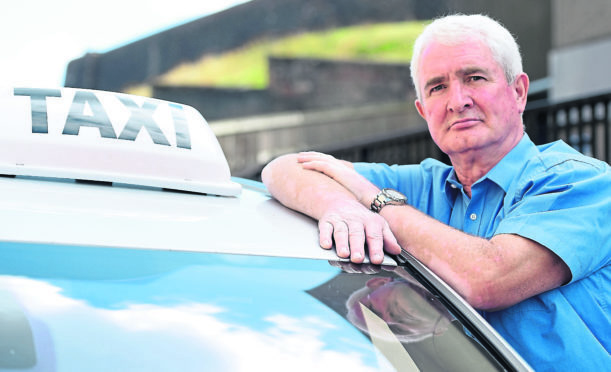Inverness taxi drivers have threatened strike action after joining ranks with a national trade union – claiming it aims to use its “clout” to take on the “arrogance and contempt” of Highland Council.
The GMB Union has pledged to take the local authority to task after the Inverness Taxi Alliance (ITA), which has around 100 members, was announced as an affiliate member yesterday.
Duncan Fraser, the proposed ITA representative to the union, said the move strengthened their cause after tensions rose amid alleged over-provision of licenses coupled with insufficient rank spaces and the imminent closure of the city’s Castle Wynd rank.
He threatened: “All the ground work has been done by the Alliance for a withdrawal of labour. It will be a nightmare for police when people are unable to get sufficient taxis and roam up the High Street for taxis. We even know which night to use.”
The pact with the union was confirmed yesterday after ITA’s Annual General Meeting where the majority of members voted in favour of joining.
Liz Gordon, of the GMB, has welcomed the taxi drivers on board, saying: “There are many challenges within this sector such as licensing, boundaries and health and safety.
“As an independent trade union, we have clout we’re prepared to use in order to tackle these issues and improve matters for GMB members.”
She added: “We will be balloting our members on industrial action should the relevant parties not be willing to sort matters out via consultation. This is the ultimate right of trade union members. However I remain positive that amicable talks will produce results.”
Mr Fraser, formerly ITA vice-chairman, did not stand for re-election in order to put his name forward to become the ITA representative to the GMB.
He said strike action was a strong possibility with the union now on board, adding: “The council has been stepping over the views of taxi drivers for too long and for them consultation is just a gesture to tick a box to say they have done that.”
Mr Fraser now sees GMB’s involvement as something of a game changer, saying: “When the union comes in at least the council will be held legally accountable and we feel that they have not always conformed to Scottish legislation.”
ITA Chairman Andrew MacDonald was delighted by the move after long complaining about what he sees as “shabby treatment” from the local authority.
He said: “For too long now the taxi trade in Inverness and indeed the Highlands has been treated with arrogance and contempt by Highland Council and recently the wishes of 3,600 members of the public were summarily snubbed in regard to the closure of the Castle Wynd Rank.”
ITA had gathered signatures for a petition against the closure of the rank as well as a potential strike.
A council spokesman denied any allegations of legal wrong-doing, adding: “The council adheres to its duties under law to act following procedure and in recognition of the roles that Taxis and Private Hire operators have.
“Careful consideration is also given to engaging beyond that which is required under law when changes in arrangements are planned, as happened in the recent alterations to taxi rank arrangements in Inverness. The council refutes any allegation accordingly.”
Councillor Ian Brown, the former chairman of Inverness City Committee, said: “It would be very disappointing if it went as far as strike action. That is no help to the drivers and it is not help for the customers.
“It could well develop into a problem but people would know in advance what was happening so they could make alternative arrangements. A strike would not be helpful for either the customer or the drivers.”
The issues
The Inverness Taxi Alliance has long campaigned for better conditions for drivers in the Highland capital.
Central to their concerns is the cost of taxi licenses which they say is endangering their livelihoods.
Official figures show fees for taxi licences in the Highlands can reach around double the equivalent charges in neighbouring areas.
In Aberdeen, the driver licence costs £105, in Aberdeenshire it is £88, and £98 in Argyll & Bute but in Inverness a driver can expect to pay £272 – the highest of all the surrounding regions.
The Alliance has also been infuriated by what they say is the over provision of licenses which is not capped, while at the same time reducing rank spaces.
The chairman of the Alliance, Andrew MacDonald, noted the number of taxis rose from about “300 in 2010 to 450 in 2018”.
Perhaps the biggest issue faced by drivers in the city is the closure of the Castle Wynd rank to make way for the redevelopment at the castle.
Mr Macdonald said relocating the rank to Bridge Street shows that planners were “apparently unaware that this rank had been formerly closed, deemed as unsafe and the rank was relocated to Castle Wynd.”
Inverness city manager David Haas earlier defended the council saying: “We recognise their position and the fact that livelihoods depend on a good rank and that is why we have taken the steps we have to offer alternatives.
“We operate fairly as a council and we recognise that taxis play a part in the transport infrastructure of the city and we would be open to discuss matters.”
